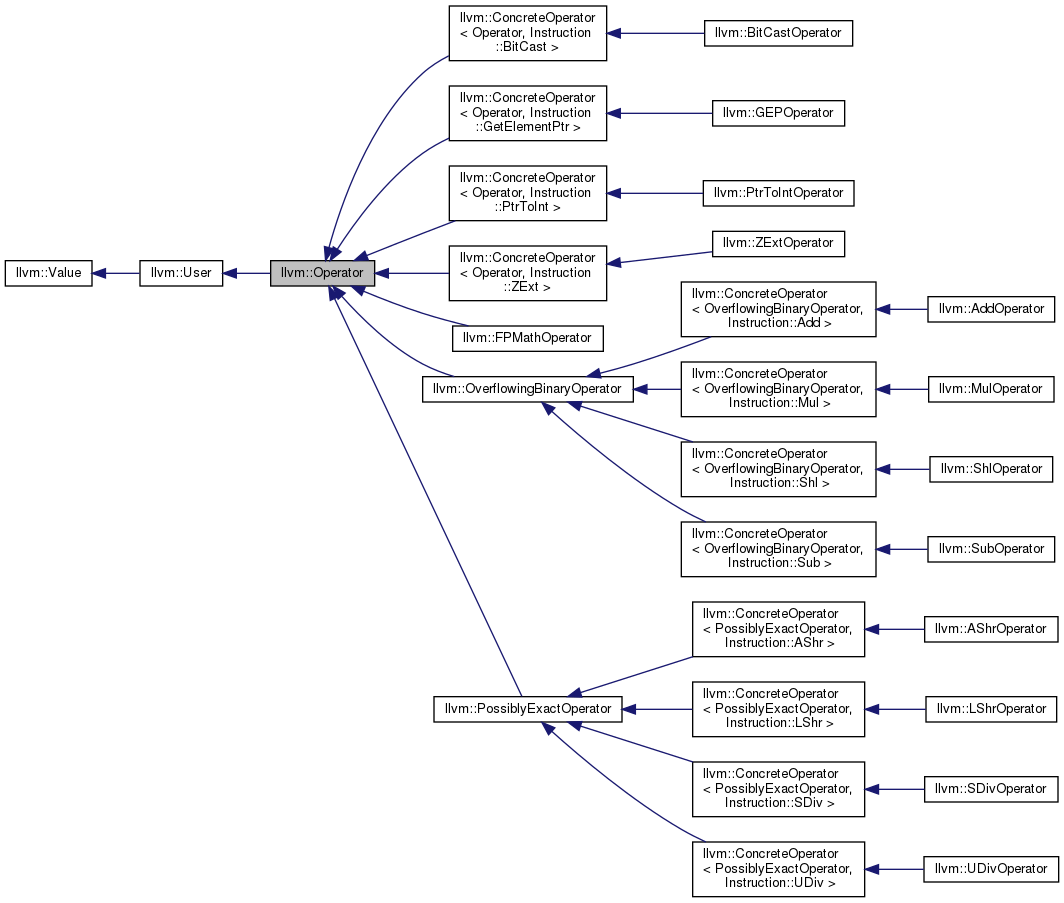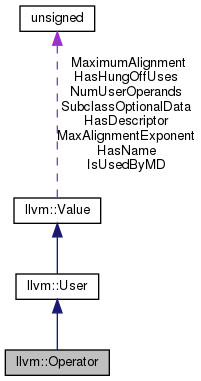This is a utility class that provides an abstraction for the common functionality between Instructions and ConstantExprs. More...
#include "llvm/IR/Operator.h"


Static Public Member Functions | |
| static unsigned | getOpcode (const Value *V) |
| If V is an Instruction or ConstantExpr, return its opcode. More... | |
| static bool | classof (const Instruction *) |
| static bool | classof (const ConstantExpr *) |
| static bool | classof (const Value *V) |
 Static Public Member Functions inherited from llvm::User Static Public Member Functions inherited from llvm::User | |
| static bool | classof (const Value *V) |
Additional Inherited Members | |
 Public Types inherited from llvm::User Public Types inherited from llvm::User | |
| using | op_iterator = Use * |
| using | const_op_iterator = const Use * |
| using | op_range = iterator_range< op_iterator > |
| using | const_op_range = iterator_range< const_op_iterator > |
 Public Types inherited from llvm::Value Public Types inherited from llvm::Value | |
| enum | ValueTy |
| Concrete subclass of this. More... | |
| using | use_iterator = use_iterator_impl< Use > |
| using | const_use_iterator = use_iterator_impl< const Use > |
| using | user_iterator = user_iterator_impl< User > |
| using | const_user_iterator = user_iterator_impl< const User > |
 Static Public Attributes inherited from llvm::Value Static Public Attributes inherited from llvm::Value | |
| static const unsigned | MaxAlignmentExponent = 29 |
| The maximum alignment for instructions. More... | |
| static const unsigned | MaximumAlignment = 1u << MaxAlignmentExponent |
 Protected Types inherited from llvm::Value Protected Types inherited from llvm::Value | |
| enum | : unsigned { NumUserOperandsBits = 28 } |
| The number of operands in the subclass. More... | |
 Protected Member Functions inherited from llvm::User Protected Member Functions inherited from llvm::User | |
| void * | operator new (size_t Size) |
| Allocate a User with an operand pointer co-allocated. More... | |
| void * | operator new (size_t Size, unsigned Us) |
| Allocate a User with the operands co-allocated. More... | |
| void * | operator new (size_t Size, unsigned Us, unsigned DescBytes) |
| Allocate a User with the operands co-allocated. More... | |
| User (Type *ty, unsigned vty, Use *, unsigned NumOps) | |
| void | allocHungoffUses (unsigned N, bool IsPhi=false) |
| Allocate the array of Uses, followed by a pointer (with bottom bit set) to the User. More... | |
| void | growHungoffUses (unsigned N, bool IsPhi=false) |
| Grow the number of hung off uses. More... | |
| ~User ()=default | |
| template<int Idx> | |
| Use & | Op () |
| template<int Idx> | |
| const Use & | Op () const |
 Protected Member Functions inherited from llvm::Value Protected Member Functions inherited from llvm::Value | |
| Value (Type *Ty, unsigned scid) | |
| ~Value () | |
| Value's destructor should be virtual by design, but that would require that Value and all of its subclasses have a vtable that effectively duplicates the information in the value ID. More... | |
| unsigned short | getSubclassDataFromValue () const |
| void | setValueSubclassData (unsigned short D) |
 Static Protected Member Functions inherited from llvm::User Static Protected Member Functions inherited from llvm::User | |
| template<int Idx, typename U > | |
| static Use & | OpFrom (const U *that) |
 Protected Attributes inherited from llvm::Value Protected Attributes inherited from llvm::Value | |
| unsigned char | SubclassOptionalData: 7 |
| Hold subclass data that can be dropped. More... | |
| unsigned | NumUserOperands: NumUserOperandsBits |
| unsigned | IsUsedByMD: 1 |
| unsigned | HasName: 1 |
| unsigned | HasHungOffUses: 1 |
| unsigned | HasDescriptor: 1 |
Detailed Description
This is a utility class that provides an abstraction for the common functionality between Instructions and ConstantExprs.
Definition at line 31 of file Operator.h.
Constructor & Destructor Documentation
◆ Operator()
|
delete |
◆ ~Operator()
|
delete |
Member Function Documentation
◆ classof() [1/3]
|
inlinestatic |
Definition at line 57 of file Operator.h.
Referenced by llvm::OverflowingBinaryOperator::classof(), llvm::PossiblyExactOperator::classof(), and llvm::ConcreteOperator< Operator, Instruction::PtrToInt >::classof().
◆ classof() [2/3]
|
inlinestatic |
Definition at line 58 of file Operator.h.
◆ classof() [3/3]
Definition at line 59 of file Operator.h.
◆ getOpcode() [1/2]
|
inline |
Return the opcode for this Instruction or ConstantExpr.
Definition at line 41 of file Operator.h.
References I.
Referenced by cannotBeOrderedLessThanZeroImpl(), cloneConstantExprWithNewAddressSpace(), computeKnownBitsFromOperator(), llvm::ComputeMultiple(), ComputeNumSignBitsImpl(), llvm::ComputeSpeculationCost(), getAdjustedPtr(), getBrevLdObject(), getMaxPointerSize(), llvm::GlobalsAAResult::getModRefBehavior(), llvm::GetPointerBaseWithConstantOffset(), getPointerOperands(), getRangeForAffineARHelper(), llvm::GetUnderlyingObject(), getUnderlyingObjectFromInt(), llvm::getUnderlyingObjectsForCodeGen(), llvm::TargetTransformInfoImplCRTPBase< AMDGPUTTIImpl >::getUserCost(), isPointerValueDeadOnEntryToFunction(), llvm::isSafeToSpeculativelyExecute(), mergeConditionalStoreToAddress(), PushDefUseChildren(), llvm::recognizeBSwapOrBitReverseIdiom(), llvm::Value::stripAndAccumulateInBoundsConstantOffsets(), and stripAndComputeConstantOffsets().
◆ getOpcode() [2/2]
If V is an Instruction or ConstantExpr, return its opcode.
Otherwise return UserOp1.
Definition at line 49 of file Operator.h.
References I.
◆ operator new()
|
delete |
The documentation for this class was generated from the following file:
- include/llvm/IR/Operator.h
 1.8.13
1.8.13